Colloquia for Fall 2024

From Extreme Heat to Freezing Temperatures: Recent Findings from Field Work in Diverse Regions
November 07, 2024
Armin Sorooshian
Hosted by Sonia Kreidenweis
Trace gases, aerosol particles, and clouds interact with each other and pose challenges in terms of how best to simulate their spatiotemporal profiles. Surface and airborne field work help increase understanding of these atmospheric components. This talk will present on recent field work in diverse regions: Arizona, northwest Atlantic, southeast Asia. Arizona has experienced rapid population…
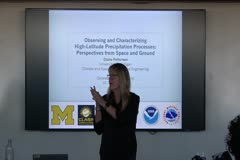
Observing and Characterizing High-Latitude Precipitation Processes: Perspectives From Space and Ground
October 31, 2024
Claire Pettersen
Hosted by Sue van den Heever
High-latitude precipitation has widespread impacts on communities through regional ecology, hydrological planning, and socioeconomic effects. Accurate forecasts or projections of precipitation accumulation in numerical weather prediction or climate models are challenging due to uncertainties in parameterizations of cloud and precipitation processes. In this presentation, I feature recent…
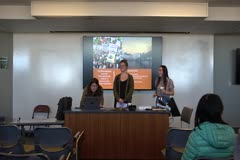
The Atmosphere around Environmental Justice: A Community-Based Overview
October 24, 2024
Stephanie Malin
Hosted by Grad. Reps
In this talk, Stephanie will provide an overview of environmental justice (EJ) and its four strands. She will then provide a grounded example of her community-based work related to air pollution and the Suncor Oil Refinery. Stephanie’s talk will conclude with a short overview on the interdisciplinary nature of EJ and its current relevance, connecting to atmospheric sciences and all the…
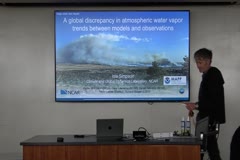
A Global Discrepancy Between Models and Observations in Atmospheric Humidity Trends Over Arid and Semi-Arid Regions
October 17, 2024
Isla Simpson
Hosted by David Thompson
Arid and semi-arid regions of the world are particularly vulnerable to greenhouse gas driven hydroclimate change. The American Southwest is a particularly clear example where recent drought has led to unprecedented water shortages in the Colorado River, and some of the most extreme wildfire seasons in recent history, and this has almost certainly been exacerbated by the substantial warming…
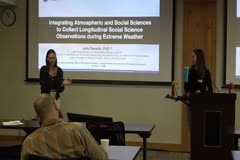
Integrating Atmospheric and Social Sciences to Collect Longitudinal Social Science Observations During Extreme Weather
October 11, 2024
Julie Demuth
Hosted by Allie Mazurek
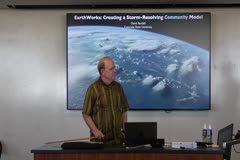
EarthWorks: Creating a Storm-Resolving Community Model
October 10, 2024
Dave Randall
Hosted by Eric Maloney
A large team of CSU and NCAR scientists has been working since the summer of 2020 to create a global storm-resolving model (GSRM) based on the Community Earth System Model (CESM). The model, now called CESM-EarthWorks or CESM-E for short, uses the Model for Prediction Across Scales (MPAS) atmospheric dynamical core developed by the Mesoscale and Microscope Meteorology Laboratory of the…
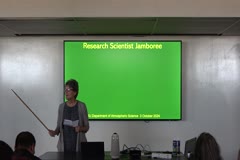
"The Secret Lives of ATS Research Scientists: A Research Scientist Jamboree"
October 03, 2024
Brenda Dolan, Marybeth Arcodia, Russell Perkins, Lantao Sun, Amy Sullivan
Hosted by Charlotte Demott
The CSU Department of Atmospheric Science is home to 20 Research Scientists (RSs). Like our Faculty, RSs have all earned their PhD, but they do not teach classes. Like our Research Coordinators, RSs are classified as Administrative Professionals, but they do not manage grants. So what exactly do RSs do? What is their role in our department? How did they get these jobs? In this presentation,…
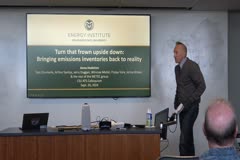
Turn that frown upside down: bringing emissions inventories closer to reality
September 26, 2024
Anna Hodshire
Hosted by Jeff Pierce
Emissions inventories of atmospheric pollutants such as greenhouse gases (GHGs) are used to identify emissions reduction targets, inform regulatory and policy action, and as inputs to broader chemistry and climate models. Methane is a potent but relatively short-lived GHG with an atmospheric lifetime of ~12 years, making it an attractive target for immediate emission reductions for climate…
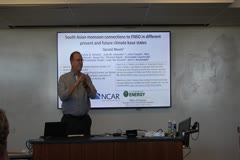
South Asian monsoon connections to ENSO in present-day and future climate base states
September 19, 2024
Gerald Meehl
Hosted by Jim Hurrell
Given the socioeconomic importance of the South Asian monsoon to the lives of millions of people living across that region, it is critical to understand the processes that produce fluctuations in the amplitude and patterns of monsoon precipitation. It is only then that credible monsoon predictions are possible for seasonal to decadal timescales, as well as longer term projections beyond…
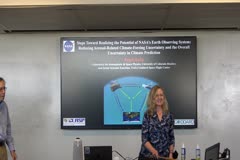
Steps Toward Realizing the Potential of NASA’s Earth Observing System: Reducing Aerosol-Related Climate-Forcing Uncertainty and the Overall Uncertainty in Climate Prediction
September 12, 2024
Ralph Kahn
Hosted by Sonia Kreidenweis
The EOS Era is drawing to a close, having produced almost 25 years of global aerosol data from instruments such as the Multi-angle Imaging SpectroRadiometer (MISR) and the MODerate resolution Imaging Spectroradiometer (MODIS). As MISR represented an entirely new instrument concept when it began taking data in late February 2000, for much of this time, work by the instrument team focused on…
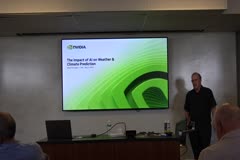
Advances in Machine Learning for Climate and Weather Simulation
September 05, 2024
Mike Pritchard
Hosted by Kristen Rasmussen
In the past two years, the use of machine learning (ML) in atmospheric simulation has rapidly advanced, leading to significant breakthroughs. This talk will present highlights from collaborative research involving NVIDIA, UC Irvine, UC Berkeley, LBNL, and the LEAP NSF Science & Technology Center at Columbia. I will cover: * Hybrid Physics-AI Climate Simulation: Advances in ML-based…
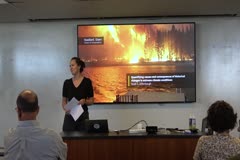
Quantifying Causes and Consequences of Historical Changes in Extreme Climate Conditions
August 29, 2024
Noah Diffenbaugh
Hosted by Libby Barnes
Although the world is making progress in ramping up ambition to reduce greenhouse gas emissions, it has now also become clear that people and ecosystems are being impacted by the global warming that has already occurred – and that those impacts are accelerating. Managing these risks – and ultimately reducing climate impacts – requires improved understanding not only of the factors that…
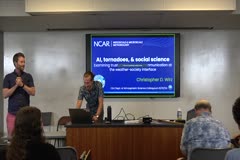
AI, Tornadoes, & Social Science: Examining Trustworthiness and Communication at the Weather-Society Interface
August 22, 2024
Chris Wirz
Hosted by Pat Keys
In this talk I demonstrate how fundamental social science can advance our understanding of how forecast information is developed, used, and communicated. I do this by highlighting results from two areas of research that examine different dimensions of the landscape surrounding forecast information: Trustworthy AI and severe weather communication. First, I highlight several ways that social…
